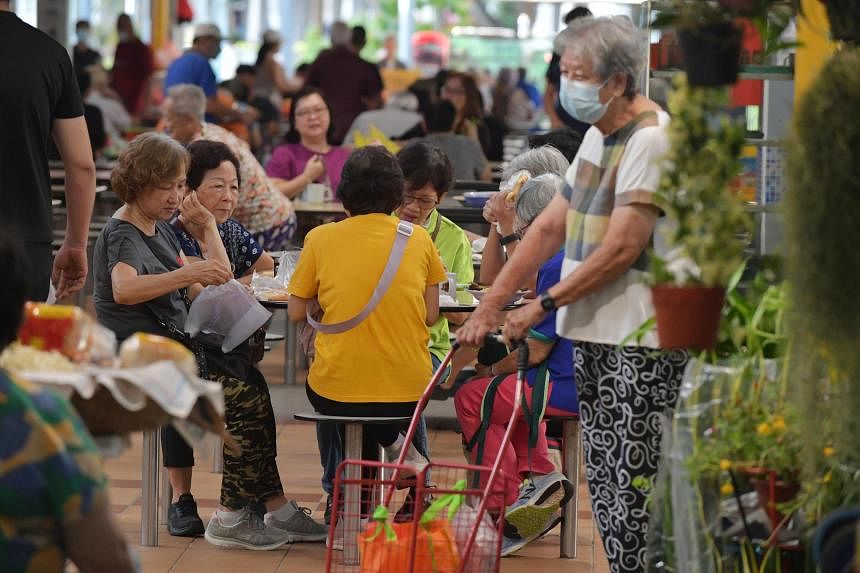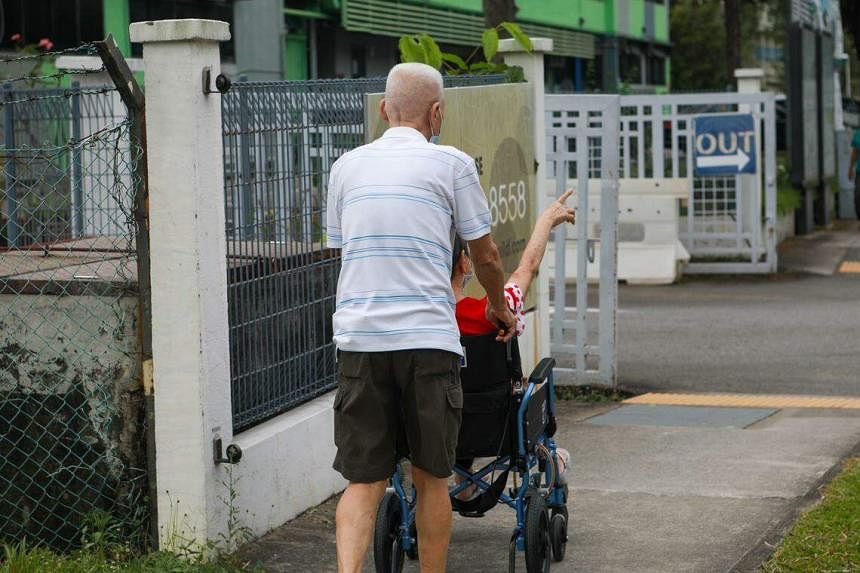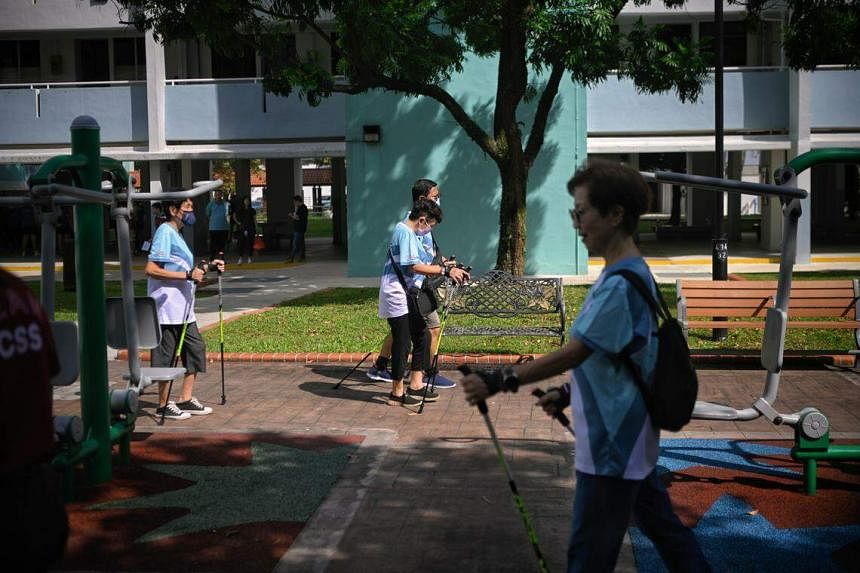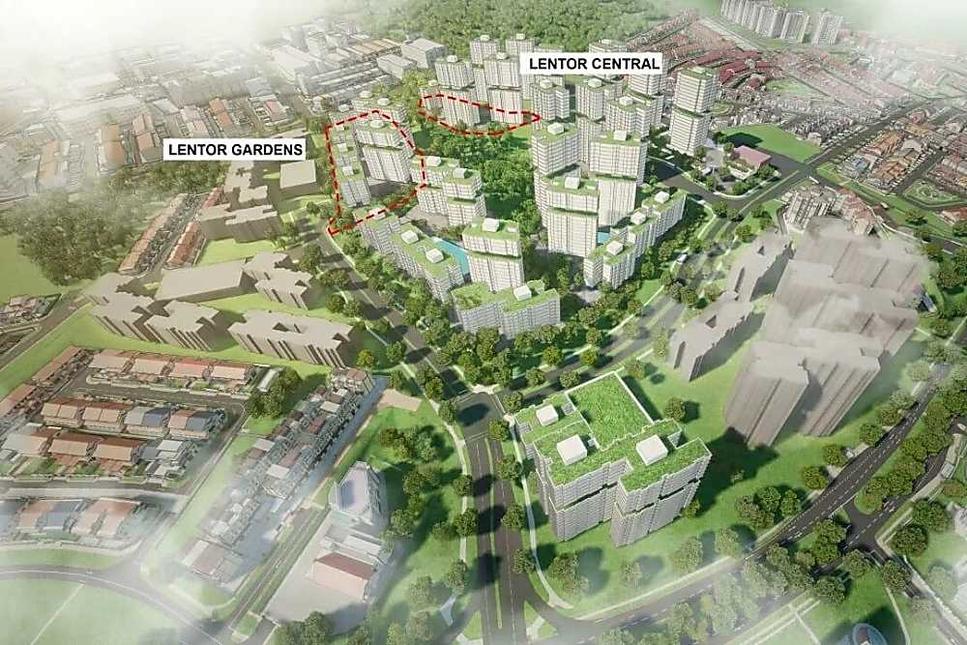Ageing happens rapidly, with huge changes in workplaces and neighbourhoods needed
Singapore is ageing and changes to our surrounding environment should support that process.

When I think about ageing, I remember my beloved grandmother who lived with me until I was in my late 20s.
Ah Ma’s brush with dementia four years before she died was painful. It started innocuously, with small things like what she had for lunch or whom she had just talked to. Then she forgot my name. Later, she could not recognise me.
Fortunately, having kept mentally, emotionally and physically active throughout her life, it was only in her advanced age at 100 that the disease took over.
Her love of sewing quilt blankets motivated her to keep sharp so she could thread the needle herself, even in her 90s.
Ah Ma also enjoyed cooking for the extended family. She would prepare from scratch, hand-rolled charcoal baked love letters and pineapple tarts every Chinese New Year, and rice dumplings during the Dragon Boat Festival.
But nature was her first love. Not only did she enjoy her twice daily walks at the park, she also had green fingers and spent a lot of time in the garden with her grandchildren and great-grandchildren, helping us learn about the different plants, how to care for them, and which would bring the right flavours into the many dishes she lovingly prepared for the family.
Still, our experience highlights the harsh reality that no one can truly know if or when dementia can strike.
The Netflix series Live To 100: Secrets Of The Blue Zones, in which researcher and National Geographic fellow Dan Buettner designated Singapore a “Blue Zone”, touches on the challenges around ageing. Singapore is one of six regions in the world where lifestyle habits helped people to live the longest, healthiest and happiest lives in the world.
Mr Buettner notes that Singapore has policies designed to keep people physically active and socially engaged. People are also encouraged to eat and live well as part of efforts to improve public health. Families whose ageing parents live with them benefit from higher tax relief, promoting social support for the elderly.
Despite these encouraging efforts, more can be done. Singapore has one of the world’s longest life expectancies. But for many, the prospect of ageing is fraught with worries – about deteriorating health and questions over how well we are equipped to age gracefully.
More government subsidies and other support schemes to aid caretakers and their loved ones are encouraging. But the most potent secret to a long, happy life is one’s way of life, shaped over a lifetime. As Mr Buettner’s research shows, long-lived people are “simply a product of their environment”.
Purposeful careers and roles in society
So how can we reshape our environment into one that eases stress and nurtures a peace of mind – enabling Singapore to remain a Blue Zone as a super-aged society?
First, how about keeping seniors engaged and gainfully employed?
In the Blue Zone of Okinawa, Japan, there is no word for retirement. Instead, Okinawans continue to pursue meaningful work well into their 90s. In another Blue Zone in Sardinia, Italy, the elderly shift to jobs that take advantage of their experience, like advising the city government, or get them moving, through engaging in walking patrols.
Singapore can do likewise, to engineer an environment where the valuable experience of the elderly is put to meaningful use. Beyond providing a continued source of income, taking on purposeful roles can keep bodies and minds sharp, staving off diseases like dementia.

After all, Singaporeans want the chance to keep active. About nine in 10 Singaporeans and permanent residents aged 50 and above said they supported a retirement age of 63 and higher, according to a recent survey. Eight in 10 were in favour of an official re-employment age of 68 and higher.
To tackle age discrimination, which remains a thorny issue in Singapore’s workplaces, organisations could create roles to tap the rich expertise and cultural insights of older workers. Organisations should support mentoring in workplaces. Older workers have much industry wisdom and practical advice to offer to younger peers navigating the transition to new careers and roles.
The Government could encourage companies to develop structured one-on-one mentoring programmes that match younger workers with senior employees. Such designated mentorship roles can benefit from enhanced wage support to incentivise organisations to take the leap.
Even after retirement from the workplace, seniors have invaluable life skills to contribute. Across Blue Zones like Icaria in Greece and the Nicoya Peninsula in Costa Rica, doing things by hand helps the elderly remain physically and mentally active. Manual tasks also help preserve traditional skills at risk of being forgotten in a highly digitalised world.
Teaching these skills enhances seniors’ sense of purpose too – a crucial factor for well-being in old age, as Mr Buettner discovered. In Singapore, Repair Kopitiam, a group run by hundreds of volunteers, organises monthly DIY repair meetups, where participants learn from the group’s volunteer coaches how to salvage and restore malfunctioning electronics, torn clothes and damaged furniture. More of such initiatives, run by or involving seniors, can impart skills to Singaporean youth and adults.
After all, when you retire from work, it doesn’t mean you retire from life.
Intersections for community gathering
Second, how about promoting more intersections where people can gather?
Community gardens hold untapped potential, as a common space for people to pursue gardening and other personal hobbies while creating opportunities for collaboration and socialising.
Community gardens may also plant the seeds for stronger community mental and physical wellness. Research shows that gardening has therapeutic benefits such as stress reduction, increased vigour and the slowing of cognitive decline. Seniors also have an additional reason to be active outdoors and engage in more regular exercise, rather than cooping themselves up at home.
And as residents make gardening a way of life, their activities ward off social isolation and renew a sense of optimism, in doing good for the less fortunate in their neighbourhoods.
We have already seen inspiring examples worth replicating: In 2022, fresh vegetables grown in community farms in Ang Mo Kio were distributed to residents facing financial difficulties in Cheng San and Seletar.
We should consider scaling up community garden initiatives across more neighbourhoods, and focus on engaging the elderly and their families to play a part.
Organising inter-generational gardening workshops for seniors and children, and adding simple features such as tables where people can gather and elderly-friendly walkways, can inject the kampung spirit back into older neighbourhoods with high concentrations of seniors like Queenstown or Bukit Merah.
Start planning for old age from young
Third, how about nurturing a culture of planning for old age in youth?
Death is not a pleasant fact of life. Understandably, most of us avoid thinking about the inevitable until we must.
Unfortunately, this dissuades many Singaporeans from preparing for old age. Sixty-one per cent of Singaporeans aged 25 to 60 were not adequately prepared for retirement, despite finances forming a key fear, according to a 2021 survey.
AIA’s 2023 Customer Survey shows “rising healthcare costs” were Singaporeans’ top worry about growing old. A whopping 72 per cent of respondents cited this as a concern, more than double the number of those who pointed to “lack of social support” (30 per cent).
Nearly seven in 10 who support their ageing parents were also stressed about growing healthcare costs, as well as rising costs of living (61 per cent) and higher caregiving costs (50 per cent).
The survey findings reveal that the increasing financial impact of ageing is now the most urgent concern that we need to tackle, to support both an ageing population and the younger generation who will bear the brunt of the costs involved. And the best way is to start with understanding our desired end point.

We need to have hard conversations with our loved ones about the worst-case scenarios. By clearly defining what a happy end-of-life means to each of us personally, we can then set out the goals and resources we need to achieve that.
Advance care planning enables us to choose how we want to be cared for at the end of our lives, but a recent survey by the Public Service Division shows that nearly one in five Singaporeans do not know how to make advance care plans. Rather than leave this process to the last, early discussion enables us to also talk about the means to fulfil our healthcare preferences based on our personal values.
Building a safety net that supports our ideal old-age care arrangements starts from a young age. It also entails planning ahead for diseases that might severely affect our quality of life and place a huge caregiving responsibility on our families.
We were fortunate that Ah Ma lived a long, fulfilling life, and her needs were taken care of by her family. This is a privilege which I believe should be a norm, with more awareness of what dementia, ageing and their challenges entail, and with the ecosystem support in place to ease life for the cared-for and the carers.
My vision of a Blue Zone Singapore is one where we all have the clarity and means to care for our loved ones as they would have chosen to be cared for – even if they are no longer able to remember this.
- Melita Teo is chief customer and digital officer at AIA Singapore.
Join ST's Telegram channel and get the latest breaking news delivered to you.





No comments:
Post a Comment